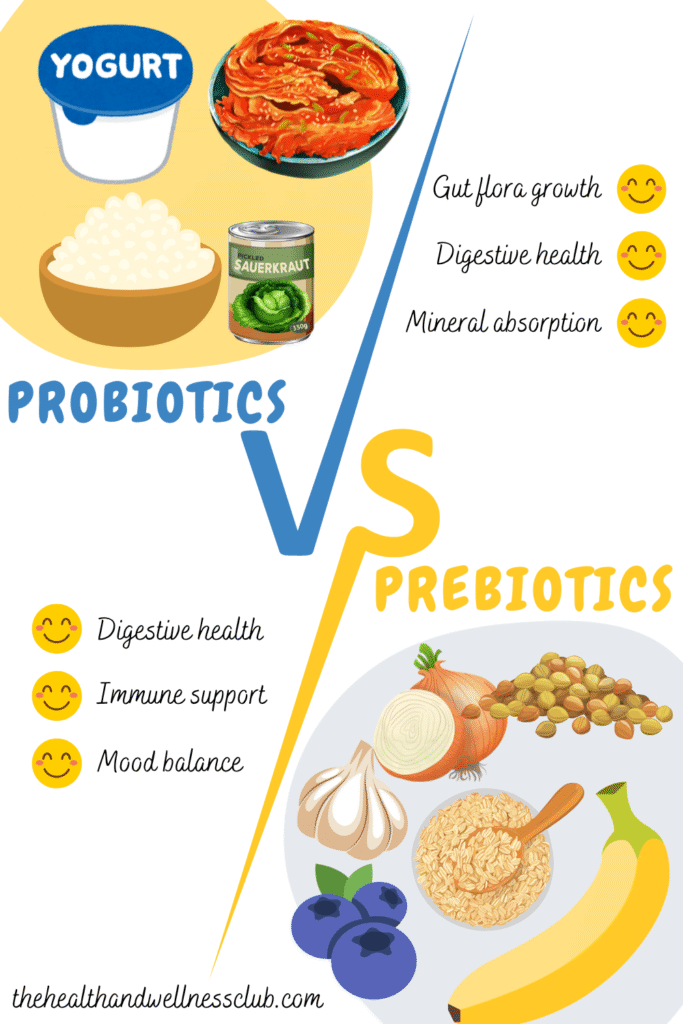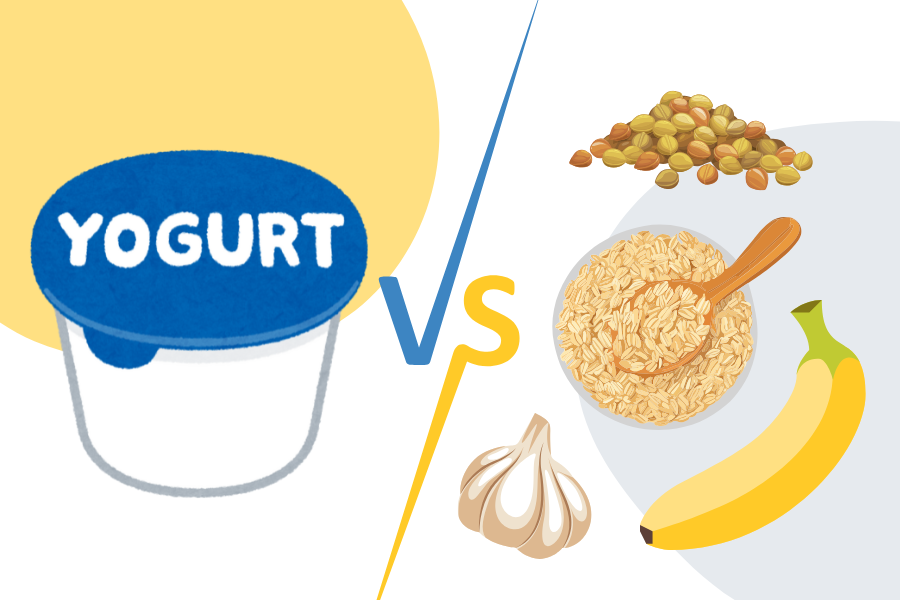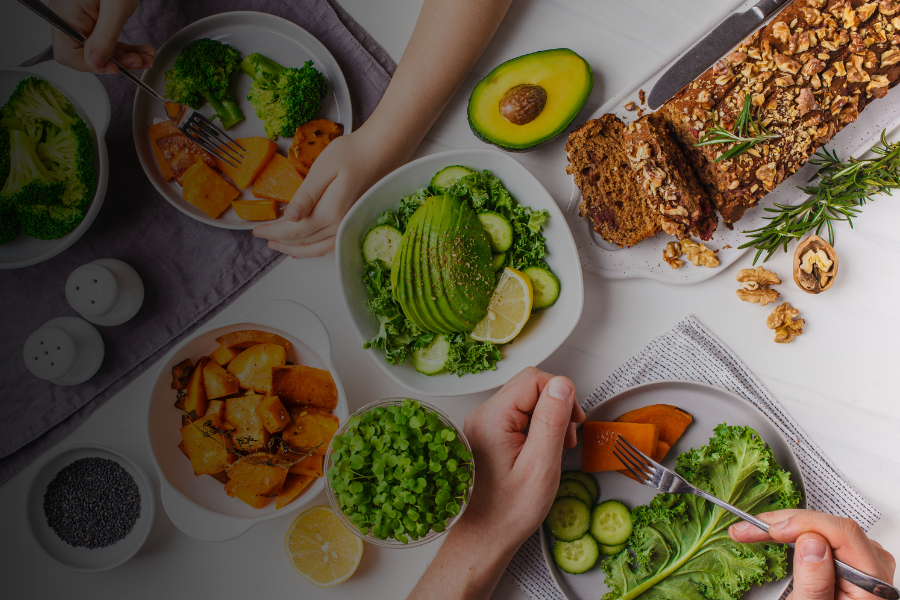Have you ever found yourself puzzled in the supplement aisle, wondering whether probiotics or prebiotics are the key to better gut health? You’re not alone. These two terms (probiotics v.s. prebiotics) often pop up in wellness blogs and product labels, promising to support your digestive system. But what exactly are they, and how do they differ?
In this blog post, we’ll demystify the world of probiotics and prebiotics, breaking down their unique roles and benefits. Whether you’re aiming to improve digestion, boost immunity, or simply feel better day-to-day, understanding the difference between these gut-friendly allies is the first step towards making smarter, more informed choices for your health goals.
Let’s dive in and explore how probiotics and prebiotics can help you achieve optimal gut health.
What Are Probiotics?
Probiotics are live microorganisms—mostly bacteria and some yeasts—that, when consumed in adequate amounts, provide health benefits to the host (that’s you!) by improving or restoring the gut flora.
Probiotics, also known as good bacteria, help keep your digestive system in balance. You can find them in fermented foods like yogurt, kefir, sauerkraut, kimchi, or even in dietary supplements.
Common Probiotic Strains:
- Lactobacillus: Great for digestion and may help with diarrhea.
- Bifidobacterium: Supports the immune system and gut barrier.
- Saccharomyces boulardii: A beneficial yeast that helps with antibiotic-associated diarrhea.
What Are Prebiotics?
Prebiotics, on the other hand, are non-digestible fibers that serve as food for your gut bacteria. They help nourish the probiotics already living in your gut, encouraging them to grow and thrive.
You can find prebiotics in foods like garlic, onions, leeks, asparagus, bananas, oats, and chicory root. They’re also available as supplements, often labeled as inulin, fructooligosaccharides (FOS), or galactooligosaccharides (GOS).
Probiotics v.s. Prebiotics: Key Differences
| Feature | Probiotics | Prebiotics |
| What they are | Live beneficial bacteria | Non-digestible fibers |
| Function | Add good bacteria to the gut | Feed existing good bacteria |
| Found in | Yogurt, kefir, kimchi, sauerkraut, kombucha tea, supplements | Garlic, onions, bananas, oats, berries, asparagus, leek, legumes, beans |
| Health benefits | Digestive health, immune support, mood balance | Gut flora growth, improved digestion, mineral absorption |

Health Benefits (Probiotics v.s. Prebiotics): What Does the Science Say?
Probiotics
Numerous studies have shown that probiotics can help with:
- Irritable Bowel Syndrome (IBS) : Certain strains like Bifidobacterium infantis have been shown to reduce bloating and discomfort.
- Antibiotic-Associated Diarrhea : Saccharomyces boulardii and Lactobacillus rhamnosus GG are particularly effective.-
- Mental Health: The gut-brain axis is real—some probiotics may help reduce symptoms of anxiety and depression .
- Immune Support: By fostering a healthy microbiome, probiotics indirectly support immune function.
Prebiotics
Prebiotics are equally powerful in their own way:
- Improved Gut Health: They selectively feed beneficial gut bacteria like Bifidobacteria and Lactobacilli.
- Enhanced Mineral Absorption: Prebiotics can improve calcium and magnesium absorption, which is great for bone health.
- Immune Support: By fostering a healthy microbiome, prebiotics indirectly support immune function.
Obtaining Probiotics and Prebiotics from Food vs. Supplements
When it comes to probiotics v.s. prebiotics, the best source isn’t a pill—it’s your plate.
Whole Foods Are More Than the Sum of Their Parts
Supplements can be helpful in specific cases, but they often isolate one or two strains or fibers. In contrast, whole foods offer a diverse range of nutrients, enzymes, and compounds that work together to support your gut and overall health. For example, fermented foods like yogurt or kimchi not only provide probiotics but also contain vitamins, minerals, and antioxidants.
Ultra-Processed Foods Can Harm Gut Health
Diets high in ultra-processed foods—think sugary snacks, packaged meals, and artificially flavored drinks—can disrupt your gut microbiome. These foods often lack fiber and are loaded with additives that may promote inflammation and reduce microbial diversity. A healthy gut thrives on real, minimally processed foods.
How to Do It Right: Gut-Friendly Eating Tips
Here’s how to naturally boost your intake of probiotics and prebiotics:
- Eat Fermented Foods Regularly
Probiotic-rich options: Yogurt with live cultures, kefir, sauerkraut, kimchi, miso, tempeh, and kombucha. Aim for a variety to introduce different beneficial strains.
- Load Up on Prebiotic Fibers
Prebiotic-rich foods: Garlic, onions, leeks, asparagus, bananas (especially slightly green), oats, and legumes. These feed your good gut bacteria and help them flourish.
Focus on whole grains, fresh fruits and vegetables, nuts, and seeds. Avoid foods with long ingredient lists, artificial sweeteners, and preservatives.
- Stay Consistent
Gut health is built over time. Make these foods a regular part of your routine rather than a one-off fix.
Who Should Avoid Probiotics or Prebiotics?
While generally safe, probiotics and prebiotics aren’t for everyone. Here’s who should be cautious:
- People with weakened immune systems (e.g., those undergoing chemotherapy or with HIV/AIDS) may risk infections from live probiotics.
- Individuals with SIBO or IBS may find that prebiotics worsen symptoms like bloating and gas.
- Critically ill or hospitalized patients should avoid probiotics due to rare but serious risks of bloodstream infections.
- Premature infants should only take probiotics under medical supervision.
- Anyone with food allergies should check supplement labels for allergens like dairy or soy.
Final Thoughts
When it comes to Probiotics v.s. Prebiotics, there’s no one-size-fits-all answer. Both play unique and complementary roles in supporting your gut and overall health. The key is to understand your body’s needs and choose accordingly.
Whether you’re looking to improve digestion, boost immunity, or simply feel better day-to-day, tuning into your gut health is a powerful step. And now that you know the difference between probiotics and prebiotics, you’re well on your way to making smarter, more informed choices.





